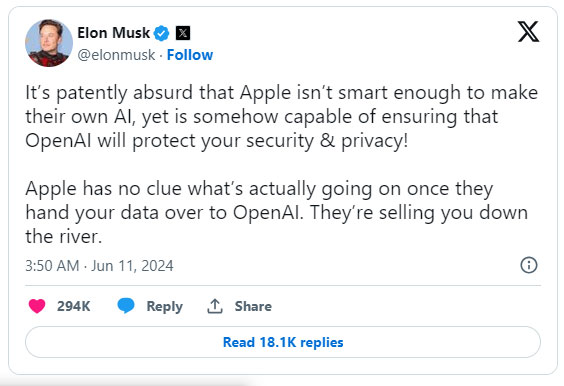Elon Musk made a mistake about Apple Intelligence
Musk threatened to ban Apple devices at his company because he said they were "security violations." In addition to introducing Apple Intelligence, Apple also partnered with OpenAI to integrate ChatGPT on Apple devices.
It seems that Musk concluded a bit hastily because the Apple Intelligence system is separate from the ChatGPT integration. Read the detailed explanation below!
How Apple Intelligence works
Right after the WWDC keynote, Elon Musk tweeted on X, 'If Apple integrates OpenAI at the OS level, then Apple devices will be banned at my companies. It is an unacceptable breach of security.'

Here, Musk and many other skeptics claim that Apple Intelligence is powered by OpenAI models, but that is not true. Apple has built its own underlying AI models for both on-device and cloud processing. There are two types of Apple AI models: One is a small on-device AI model trained on 3 billion parameters, and the other is a large AI model hosted on Apple's cloud servers.

The model on Apple devices performs local processing and does not send data to any provider. And to host the mainframe model, Apple developed Private Cloud Compute, a cloud server built from the ground up by Apple to handle AI requests privately and securely. As explained in the linked article, Private Cloud Compute does not store personal data, and not even Apple can access it.

For ChatGPT integration, Apple devices will always ask permission before sending user queries to OpenAI servers. So, it's up to you to decide whether you want to use ChatGPT on your iPhone, iPad or Mac or not. Additionally, during the keynote, Apple announced that OpenAI will not log user queries.
On its blog, OpenAI also noted:
Privacy protections are built in when accessing ChatGPT in Siri and Writing Tools - requests are not stored by OpenAI and the user's IP address is hidden.
While OpenAI has had a checkered history - especially considering the recent ScarJo controversy - this assurance may be useful to some users.
As argued by Elon Musk, ChatGPT can be integrated at the operating system level - yes, it really is integrated to provide a seamless experience through Siri and Writing Tools with little effort. However, Apple devices will always ask permission before sending any user queries. Don't forget, ChatGPT isn't the only AI model coming to Apple devices.
Apple said more AI models, including Google's Gemini model, will appear on iOS and other Apple platforms. So the exclusivity agreement is not limited to OpenAI. Users who don't like OpenAI could very well choose other AI models to handle AI requests, if the models on Apple's devices and servers don't perform the task intelligently.
In short, for most users, Apple's AI models can do the job quite well. And Elon Musk can choose not to send AI requests to ChatGPT or choose other AI models if desired.
You should read it
- ★ Elon Musk says the probability of AI destroying humanity is 20%, experts put the risk at nearly 100%
- ★ Learn from the 'extraordinary' living schedule of billionaire Elon Musk?
- ★ 12 sentences of billionaire Elon Musk: The madman or genius?
- ★ Elon Musk criticized Apple, saying that recent iOS updates broke the email system
- ★ Elon Musk confirmed his intention to charge a temporary fee to let new user X post